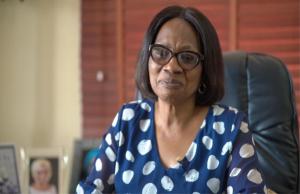Healthy diet and lifestyle modification essential to preventing diabetes
Abuja, 24 November, 2021 - “For diabetes, prevention is the cheaper option. With healthy diet and lifestyle, we can avoid the killer disease” says Dr Felicia Anumah, a Professor of Medicine and Endocrinology, a Diabetologist and the current Dean Faculty of Clinical Sciences University of Abuja, Gwagwalada.
“There’s unfortunately, a high out of pocket expenditure in Nigeria and with Diabetes care being a chronic disease, a lot of people are not able to afford to pay for care and medicines. Creating awareness on insurance and improving coverage especially capturing the informal sector is one of the way forward” she added.
Diabetes like other Noncommunicable Diseases (NCDs) share common risk factors including tobacco use, harmful use of alcohol, physical inactivity and unhealthy diet. Ageing, rapid urbanization and globalization are also underlying risk factors. “Family history is also a factor, if one parent has diabetes one has 40 percent chance of developing it and if both parents do, one has a 60 percent chance”
“People change their diet from the naturally healthy diet to unhealthy “civilized” diet. We eat refined food with high content of salt, oil as well as sugar which increase our blood glucose and people feel like it is a sign of affluence. We are meant to burn all calories we take in and without doing that, excess fat accumulates. “When sugar is high, it disturbs everywhere blood goes, eye, brain, heart, kidneys, nerves and blood vessels. Complications are devastating, mutilating and expensive” narrated Dr Anumah.
Every year on November 14, the World Health Organization (WHO) commemorates World Diabetes Day which provides an opportunity to raise awareness of diabetes as a global public health issue and what needs to be done, collectively and individually, for better prevention, diagnosis and management of the condition. This year’s theme is “Access to Diabetic Care”.
Speaking about access to diabetic care in Nigeria, Dr Anumah mentioned that while diabetes remains a complex disease requiring specialists to handle, the country has shortage of diabetes specialists. Most patients delay to access care and may go to Primary Health Care Centers (PHC) before seeing a specialist. They present late when the condition has already deteriorated leading to blindness, amputation and/or organ failure. A healthy diet, regular physical activity, maintaining a normal body weight and avoiding tobacco use are ways to prevent or delay the onset of type 2 diabetes.
According to WHO, Insulin is the primary treatment for diabetes – it turns a deadly disease into a manageable one for nine million people with type one diabetes. For more than 60 million people living with type two diabetes, insulin is essential in reducing the risk of kidney failure, blindness and limb amputation.
However, one of every two people needing insulin for type two diabetes does not get it. Diabetes is on the rise in low- and middle-income countries, and yet their consumption of insulin has not kept up with the growing disease burden.
About 422 million people worldwide have diabetes, the majority living in low-and middle-income countries, and 1.5 million deaths are directly attributed to diabetes each year. Both the number of cases and the prevalence of diabetes have been steadily increasing over the past few decades. The 2018 WHO
Noncommunicable Diseases profile for Nigeria showed that 1% of Nigerians have diabetes.
WHO Nigeria is supporting the Federal Ministry of Health to implement the 2019-2025 National Non-Communicable Diseases (NCDs) Multisectoral Action Plan which outlines key priorities for the prevention and control of NCDs, including diabetes. Together with the Federal Ministry of Health and the FCT Human and Health Services Secretariat, WHO is supporting the WHO Package of Essential NCDs Interventions which is aimed at strengthening NCDs interventions at the Primary Health Care level in selected facilities in the FCT.
Technical Contact:
Dr Kelias Msyambozak; Email: msyambozak [at] who.int (msyambozak[at]who[dot]int); Tel: +234 906 278 4292



